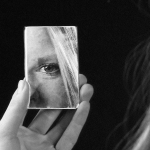Working late tonight. Don’t need dinner. Don’t wait up x
Hera’s phone was already in her hand when the text from Bruce popped up. She held onto the double-decker bus railing with one hand, the phone with the other, and stared at it. It had been going on for months, and it was getting worse.
He had turned into a broad back, fleeing out the door with a shout of ‘Bye!’ A fridge door left swinging open and the remains of a kebab in the bin. The fleeting outline of a man, rapidly losing definition.
It was time to escalate. She began to swipe-text one-handed.
What… the… f…
She hardly ever swore. He would call her.
The woman in front of her moved down the steep steps inside the double-decker bus. Hera followed automatically, still texting one-handed; her feet finding each step with the surety of habit. Then the next step wasn’t there—she was flung forward at the speed the bus had been moving at before it stopped, with a hideous jerk—the bottom of the stairwell and the people on it were zooming up towards her, and she crashed back to earth on her right hip, phone still in her hand, feet tangled up with someone’s denim-clad legs.
‘Sorry, I’m so sorry,’ Hera babbled to the young woman she’d landed on. The woman shrugged and with a small brushing motion seemed to indicate that she was fine.
‘Are you all right?’ An older woman leaned towards her.
‘I’m fine.’ Hera could feel a line of agony along her thigh where she’d connected with the stairs, but to prove she was fine, she jumped to her feet, flexing her arms.
‘It was your shoes,’ announced a man standing nearby, knowingly. Hera had become the centre of a small circle of interest.
‘It wasn’t my shoes. These are good shoes,’ Hera said defensively. ‘It was because I was looking at my phone. It was my fault.’
‘It was your shoes,’ he repeated.
The bus was pulling in to the stop. ‘Are you sure you’re all right?’ the woman double-checked.
‘Yes, yes.’
‘Well, you’ve probably had quite a shock. You should sit down,’ she said, with a mild reproof in her voice. ‘Actually, you should have fallen down outside a pub, because then they’d take you in and give you a cup of tea.’
Hera stared at her.
‘I’m trying to share my experience with you,’ she said, and got off the bus.
Hera got off too and sat down at the bus stop. Driver must’ve braked hard, but that’s what they did. No one else had fallen. She looked at her shoes: well-worn, low-heeled Chelsea boots. She didn’t blame them.
She sat and sent Bruce a shaky text:
Okay.
He didn’t come home till after 2am that night. She heard him fumble with his keys, bump cupboard doors in the kitchen, swear at the toaster. As he pushed the bedroom door open, she tapped her phone screen dark. He came in, shedding his clothes onto the floor. He got into bed, on his side of the bed: the whole mattress swayed, but she lay motionless, bruises throbbing. He smelt like burnt toast, with a tang of man underneath.
Hera opened her mouth; closed it again. Looked over at him, in the pitch dark, overlaid with glaring phone screen afterimages.
She thought: I’m trying to share my experience with you.
Should I get new shoes?
‘You awake?’ he said. In the thick hostility of his voice was the jerk of a bus stopped without warning, and she felt herself flying into space as she moved forward at the same speed they had both been moving at before the brakes were applied. She heard the way he spoke to her; really heard it this time, echoing back with new resonance through all the interactions they’d had for months. For years. This is all wrong.
In freefall, matters were simplified—this way was up, this way down, and factor in the acceleration due to gravity. She had already decided. Tomorrow, she would get new shoes. Shoes that cherished her feet; shoes that were like walking on air. The thought lifted her like a child with a present to be unwrapped—a wonderful future surprise.
‘I’m awake now.’
…
Biography
Sharni Wilson is an Aotearoa New Zealand writer of fiction and a Japanese-to-English literary translator. Her work has appeared in Landfall, Takahe, and the Best of Auckland, among others. She was a finalist for Lunch Ticket’s Gabo Prize in 2020.
Image: unsplash.com





